
TAI SAM CORPORATION
www.tai-sam.com
由鑫國際有限公司TAI SAM CORPORATION
- TEL: +886-2-26028689
- FAX: +886-2-26031387
- E-mail: info@yoeshin.com.tw;sales@tai-sam.com.tw
- Address: No. 371, Sec.2, Wenhua 2nd Rd., Linkou Dist., New Taipei City 244, Taiwan (R.O.C)
Cabinet lock. Different Key . High anti-theft
Operation Process
Japanese cabinet locks are essential components in various settings across Japan, where they are used to secure cabinets, drawers, and other storage units. These locks are designed to provide security, ensure privacy, and protect valuable items. The use of cabinet locks in Japan reflects the country's emphasis on safety, organization, and attention to detail, which are key aspects of Japanese culture. Below is an in-depth exploration of where Japanese cabinet locks are used, covering residential, commercial, industrial, and other sectors.
1. Residential Use: Home Security and Organization
In Japanese homes, cabinet locks are widely used to secure personal belongings, maintain privacy, and ensure the safety of household items. The typical Japanese home, whether a traditional "minka" or a modern apartment, incorporates cabinet locks in various areas for different purposes.
Kitchen Cabinets In the kitchen, cabinet locks are often used to secure cabinets containing hazardous materials such as cleaning supplies, chemicals, or sharp objects. This is particularly important in homes with children, where safety is a priority. Locks on these cabinets prevent accidental access and ensure that dangerous items are kept out of reach.
Bathroom Cabinets In bathrooms, cabinets often contain personal hygiene products, medications, and other private items. Cabinet locks provide a level of privacy and security, ensuring that these items are accessible only to authorized individuals, such as the homeowner or family members.
Bedroom and Closet Cabinets In bedrooms, cabinet locks are commonly used on wardrobes and closet cabinets to protect personal belongings, such as clothing, jewelry, and important documents. These locks offer both security and privacy, allowing individuals to store valuable or private items securely within their personal spaces.
Living Room and Entertainment Units In the living room, cabinet locks might be used on entertainment units or display cabinets that house valuable electronics, such as gaming consoles, DVDs, or sound systems. Additionally, locks on display cabinets that contain valuable or fragile items, such as collectibles or fine china, provide an extra layer of protection.
Home Office and Study Areas With the rise of remote work, many Japanese homes now have dedicated office or study spaces. Cabinet locks in these areas secure important documents, electronics, and office supplies, ensuring that sensitive information and valuable items are protected.
2. Commercial and Retail Settings
In commercial and retail environments, Japanese cabinet locks are vital for securing inventory, safeguarding financial assets, and protecting sensitive information. These locks are commonly found in various types of businesses, from small shops to large corporations.
Retail Stores In retail settings, cabinet locks are used to secure display cases containing valuable merchandise, such as jewelry, watches, and electronics. These locks prevent theft and ensure that high-value items are only accessible to authorized staff. In addition, storage cabinets in backrooms or stock areas are often locked to protect inventory from theft or unauthorized access.
Offices and Workplaces In office environments, cabinet locks are essential for securing documents, files, and office supplies. Locks on filing cabinets protect sensitive information, such as employee records, financial documents, and contracts, from unauthorized access. In addition, personal storage cabinets or lockers used by employees to store their belongings are also secured with locks.
Restaurants and Cafes In the food and beverage industry, cabinet locks are used to secure cash registers, storage cabinets containing alcohol, and other valuable items. For example, in a Japanese izakaya (a type of informal pub), locked cabinets might be used to store bottles of expensive sake or whiskey, ensuring that these items are only accessible to staff and preventing theft.
Medical and Healthcare Facilities In clinics, hospitals, and pharmacies, cabinet locks are critical for securing medications, medical supplies, and sensitive patient records. These locks ensure that controlled substances are only accessible to authorized personnel and that patient confidentiality is maintained by restricting access to medical records.
3. Educational Institutions
In schools, universities, and other educational facilities across Japan, cabinet locks play an important role in protecting educational resources, ensuring student privacy, and maintaining order.
Classroom Storage In classrooms, cabinet locks are used to secure teaching materials, equipment, and student records. For example, a teacher may lock cabinets containing test papers, confidential student files, or expensive educational tools like microscopes or tablets.
Libraries In school and university libraries, locked cabinets protect valuable or rare books, archival materials, and multimedia resources. These cabinets ensure that only authorized individuals, such as librarians or researchers, can access these items, preserving their condition and preventing unauthorized removal.
Laboratories and Workshops In science labs, art studios, and technical workshops, cabinet locks are used to secure hazardous materials, specialized equipment, and valuable tools. For example, in a chemistry lab, cabinets containing chemicals and glassware are locked to prevent accidents and unauthorized access, ensuring a safe learning environment.
4. Industrial and Manufacturing Environments
In industrial and manufacturing settings, cabinet locks are used to secure tools, equipment, and sensitive materials, ensuring safety and preventing theft.
Tool Storage In factories and workshops, tools and equipment are often stored in locked cabinets to prevent unauthorized access and theft. These cabinets may contain expensive or specialized tools that are essential for production processes. By securing these items, businesses can reduce the risk of loss and ensure that tools are readily available for authorized workers.
Material Storage In manufacturing environments, locked cabinets may be used to store raw materials, chemicals, or components that are crucial to the production process. Securing these items helps prevent accidents, contamination, or misuse, contributing to the overall safety and efficiency of the workplace.
Equipment Maintenance Rooms In industrial settings, maintenance rooms often contain a variety of spare parts, tools, and repair equipment. Cabinet locks in these rooms ensure that these valuable resources are only accessible to authorized personnel, reducing the risk of theft and ensuring that equipment can be promptly repaired when needed.
5. Hospitality and Tourism Industry
In the hospitality sector, including hotels, ryokan (traditional Japanese inns), and tourism-related businesses, cabinet locks are widely used to enhance security and privacy for guests and staff.
Guest Room Safes Many hotels and ryokan provide in-room safes or locked cabinets where guests can store their valuables, such as passports, money, and jewelry. These locks provide peace of mind to guests, knowing that their belongings are secure during their stay.
Staff Areas In hospitality establishments, staff areas such as changing rooms, offices, and storage rooms are often equipped with locked cabinets to secure personal belongings, uniforms, and operational supplies. These locks help prevent theft and ensure that staff can store their items safely while on duty.
Reception and Front Desk In hotels and other lodging facilities, the reception area often contains locked cabinets that secure important documents, guest records, and financial assets, such as cash drawers or credit card machines. These locks ensure that sensitive information and valuable items are protected, contributing to the overall security of the establishment.
6. Transportation and Infrastructure
In transportation hubs and infrastructure-related facilities, cabinet locks are used to secure critical components, equipment, and sensitive information.
Train Stations and Airports In major transportation hubs like train stations and airports, locked cabinets are used to secure operational equipment, maintenance tools, and security devices. For example, cabinets containing surveillance equipment, ticketing systems, or communication devices are locked to prevent tampering and ensure that these essential systems remain operational.
Public Transportation On buses, trains, and trams, cabinet locks may be used to secure driver compartments, ticketing machines, and other operational equipment. These locks help prevent unauthorized access and ensure the safety and security of public transportation systems.
Infrastructure Maintenance In facilities related to infrastructure maintenance, such as power plants, water treatment facilities, and communication centers, cabinet locks secure critical tools, spare parts, and sensitive documents. These locks play a vital role in protecting the integrity and security of essential public services.
7. Cultural and Religious Sites
In Japan, cultural and religious sites, such as temples, shrines, and museums, often use cabinet locks to protect valuable artifacts, religious items, and important documents.
Temples and Shrines In Buddhist temples and Shinto shrines, locked cabinets may be used to store sacred items, religious texts, and ceremonial objects. These locks ensure that these important items are protected from theft or damage, preserving Japan's cultural and religious heritage.
Museums and Cultural Centers In museums and cultural centers, locked display cabinets protect valuable artifacts, art pieces, and historical documents. These locks ensure that these irreplaceable items are securely displayed, allowing the public to appreciate them while preventing unauthorized access.
8. Legal and Government Offices
In legal and government offices, cabinet locks are crucial for securing confidential documents, sensitive information, and valuable items.
Courts and Legal Firms In legal settings, locked cabinets protect case files, legal documents, and sensitive information from unauthorized access. These locks ensure that confidential information remains secure, maintaining the integrity of legal processes.
Government Offices In government offices, cabinet locks are used to secure important records, official documents, and operational supplies. For example, in a city hall or local government office, locked cabinets might contain birth records, property deeds, or other official documents that require a high level of security.
Conclusion
Japanese cabinet locks are used in a wide variety of settings, each reflecting the country’s emphasis on security, privacy, and organization. From residential homes to commercial enterprises, educational institutions to industrial environments, these locks play a crucial role in protecting valuable items, ensuring the safety of individuals, and maintaining the orderly functioning of spaces. Whether securing personal belongings, sensitive information, or critical equipment, cabinet locks are an integral part of Japanese daily life, contributing to the overall sense of safety and efficiency that characterizes many aspects of Japanese society.
RoHS Three Point Lock Changeable Lock Point IP64 Right and Left Side Opening
- Opened by Special Tool & Key
- Material: Zinc Alloy
- S.Tr: Black Finish
- Handle Strength:≦ 310N
- Handle Torque:≦ 33N.m
- Maximum Static Load: 300N
- Can be custom made with different lock and key combination(over 1000 key numbers)
- Life cycle test more than 10,000 times
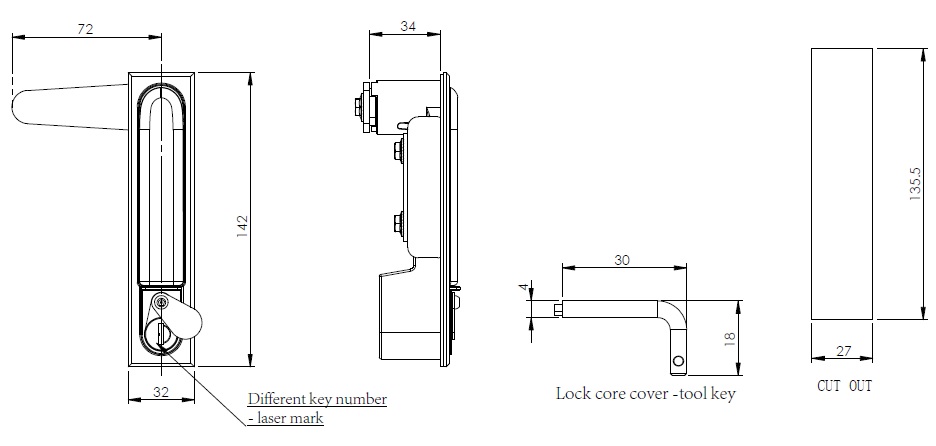





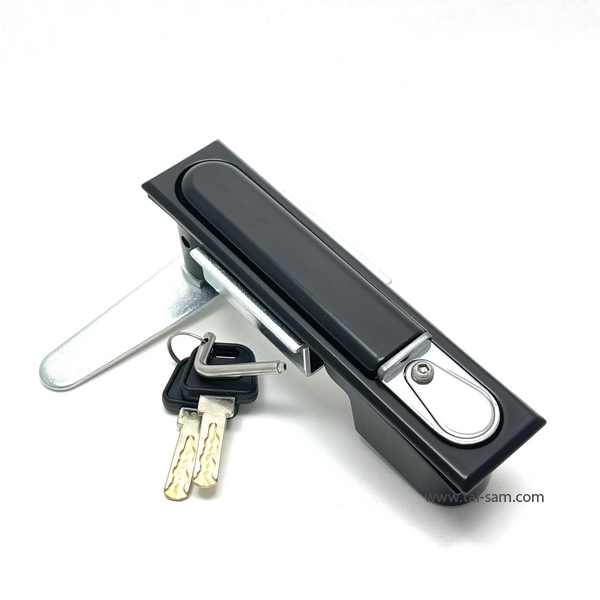

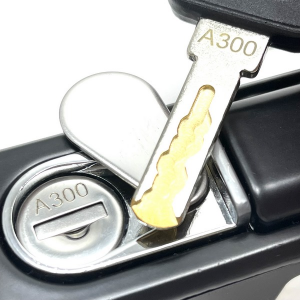
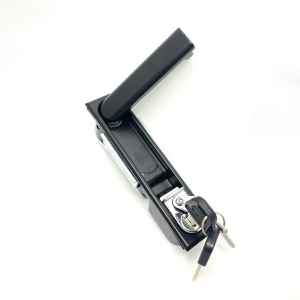
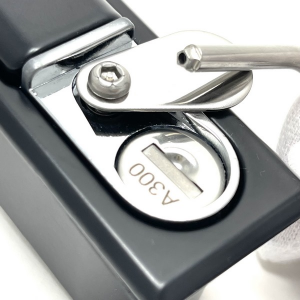






 +886-2-26031387
+886-2-26031387

